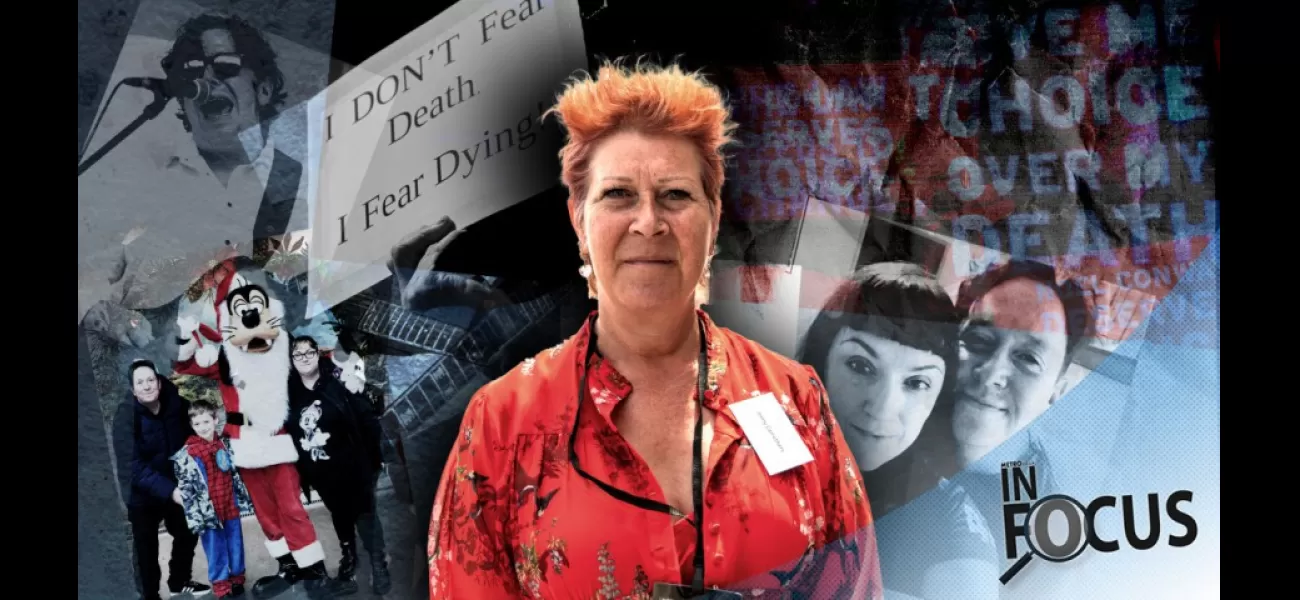I fear death, but I cannot bear endless suffering.
The person does not want to become consumed by a world of morphine.
August 23rd 2024.

Campaigners have shared their beliefs with Metro on why it is important for terminally ill, mentally competent adults to have the choice of assisted dying. This issue hits close to home for many, including Tom Davenport. When Tom was diagnosed with terminal bile duct cancer, he refused to let it control his life. Despite the grim prognosis, he made it his mission to make the most of the time he had left.
As a music teacher, Tom had a passion for music that he passed on to his son Joss. He even organized a fundraiser called the 'Gig of a Lifetime' to celebrate his achievements and raise money for a good cause. He also made sure to fulfill his personal dreams, like seeing his favorite band KISS live and taking a special trip to Disneyland Paris with his wife Lucy.
But as his condition worsened, Tom moved into a hospice for end-of-life care. He and his loved ones hoped for a peaceful passing, but unfortunately, that was not the case. Tom's final day on August 28, 2023, turned into a nightmare for his family and friends. His wife Lucy and sisters Ailsa and Janet shared with Metro the traumatic experience of watching Tom suffer and eventually pass away.
Tom's cancer had obstructed his bowel, causing fecal matter to rise through his body and out of his mouth. Despite their best efforts, Lucy, Janet, and Ailsa could only hold his head up to prevent him from choking as they witnessed his agony. They were left feeling helpless and desperate for his suffering to end, but unfortunately, it took five agonizing hours for Tom to pass away.
Janet, who had worked as a nurse for 40 years, couldn't help but wonder if there was something more that could have been done to ease Tom's pain. She believes that what Tom really needed was the option to choose to end his life peacefully. However, due to the current laws, medical staff would have faced prosecution for providing such assistance.
Ailsa also recalls the horror of Tom's death and how it has affected their family, especially Lucy. She describes the look of terror and horror on Tom's face as something that will haunt them forever. It's not the way they want to remember their beloved brother and husband.
Still reeling from the traumatic experience, Ailsa, Janet, and Lucy decided to reach out to Dignity in Dying, a group that advocates for a change in the law to allow assisted dying as a choice for terminally ill, mentally competent adults. They strongly believe that people should have the right to choose how they want to die, and access to high-quality end-of-life care.
Unfortunately, the UK is one of the few countries where assisted dying is not legal. This means that for the 67 million people living in the UK, it would be breaking the law to help a terminally ill loved one end their suffering. Lucy emphasizes that this isn't about shortening lives, but rather shortening the pain and giving people a choice.
Tom's battle with cancer began in September 2022 when he was diagnosed with stage four bile duct cancer. He had shown little symptoms, with the yellowing of his eyes being the only noticeable sign. Despite the grim prognosis, Tom remained mentally tough and even reached out to his family to explain the news and his plans for the future.
Lucy remembers how Tom would have good and bad days, and on the tough days, he would make her promise to help him end his suffering if it became too much. This was a difficult conversation to have, knowing that it could land her in prison. As a couple, they discussed this option, but ultimately it was not possible due to the laws in place.
A week before he passed away, Tom hosted a gathering with his family, his "last beers" in the sunshine. He confided in his sister Ailsa that he was ready to die, and in a private conversation with his mother-in-law, he asked her to take care of Lucy and Joss. He was saying his goodbyes, knowing that his time was limited. But despite being mentally competent, he did not have the choice to end his suffering.
Since Tom's passing, Janet, Lucy, and Ailsa have visited the House of Commons twice to advocate for a change in the law. They are determined to use their voices to ensure that no more families have to go through the same traumatic experience they did.
According to the statistics, about 6,400 people die in pain or with uncontrollable symptoms every year in the UK. This is a staggering number, and Janet believes it is far too many. She states that this is not about shortening lives, but rather about giving people the choice to end their suffering with dignity.
Despite these heartbreaking stories and statistics, the potential change in the law has faced opposition from some MPs, such as Danny Kruger, who cites his religious beliefs as the reason for his stance. The debate continues, but for the Davenport family, it's not just a political issue – it's a personal one that they will continue to fight for.
Campaigners argue that terminally ill, mentally competent adults should have the option of assisted dying as a compassionate and humane choice for those facing unbearable suffering at the end of their lives. This issue hits close to home for Tom Davenport, a 48-year-old music teacher from Scarborough who was diagnosed with terminal bile duct cancer. Despite his diagnosis, Tom was determined to make the most of the time he had left. He even organized a fundraiser concert to celebrate his life and achievements, surrounded by loved ones.
As his condition worsened, Tom moved into a hospice where he received excellent care. However, his final day on August 28, 2023, was far from peaceful. Tom's wife Lucy and his sisters Ailsa and Janet recall the horror of watching him violently vomit as his body was overcome by the cancer. Despite their best efforts to comfort him, Tom's death was traumatic and agonizing.
The family believes that Tom should have had the option to end his suffering on his own terms. However, current laws prohibit medical staff from assisting in the death of a terminally ill patient, leaving them with no choice but to watch their loved one suffer. Janet, a nurse with 40 years of experience, reflects on the heartbreaking moments and wonders if more could have been done to ease Tom's pain. She also points out that this issue is not about shortening lives, but rather about giving individuals the choice to shorten their deaths and die with dignity.
Tom's cancer was diagnosed in September 2022, with a very poor prognosis and a survival rate of only 2%. Despite this, Tom remained positive and resilient, making the most of his time with his loved ones. However, there were also difficult days, and he often discussed his wishes to end his suffering if it became too much. But the current laws and fear of prosecution prevented him from making this choice.
In his final days, Tom said goodbye to his family and confided in his sisters that he was ready to die. He also had a private conversation with his mother-in-law, asking her to take care of Lucy and their young son. His family remembers him as a mentally tough and competent person who should have had the right to make his own decisions about his end-of-life care.
Tom's sisters and wife have since become advocates for Dignity in Dying, a group that campaigns for assisted dying to be legalized for terminally ill, mentally competent adults. They have visited the House of Commons and are determined to keep raising their voices to prevent other families from going through the same traumatic experience.
While there are clinics like Dignitas in Pfaeffikon, Switzerland, that offer assisted dying, the cost is too high for many people. In the UK, it is illegal for medical staff to assist in the death of a terminally ill person, leaving them with no other option but to suffer until their natural death. The campaigners argue that this is unacceptable, and the law needs to change to give people the right to a peaceful and dignified death. However, some religious beliefs and personal opinions have sparked backlash against this potential change in the law. Nevertheless, for Tom's family and many others who have watched their loved ones suffer, this is a matter of compassion and humanity.
As a music teacher, Tom had a passion for music that he passed on to his son Joss. He even organized a fundraiser called the 'Gig of a Lifetime' to celebrate his achievements and raise money for a good cause. He also made sure to fulfill his personal dreams, like seeing his favorite band KISS live and taking a special trip to Disneyland Paris with his wife Lucy.
But as his condition worsened, Tom moved into a hospice for end-of-life care. He and his loved ones hoped for a peaceful passing, but unfortunately, that was not the case. Tom's final day on August 28, 2023, turned into a nightmare for his family and friends. His wife Lucy and sisters Ailsa and Janet shared with Metro the traumatic experience of watching Tom suffer and eventually pass away.
Tom's cancer had obstructed his bowel, causing fecal matter to rise through his body and out of his mouth. Despite their best efforts, Lucy, Janet, and Ailsa could only hold his head up to prevent him from choking as they witnessed his agony. They were left feeling helpless and desperate for his suffering to end, but unfortunately, it took five agonizing hours for Tom to pass away.
Janet, who had worked as a nurse for 40 years, couldn't help but wonder if there was something more that could have been done to ease Tom's pain. She believes that what Tom really needed was the option to choose to end his life peacefully. However, due to the current laws, medical staff would have faced prosecution for providing such assistance.
Ailsa also recalls the horror of Tom's death and how it has affected their family, especially Lucy. She describes the look of terror and horror on Tom's face as something that will haunt them forever. It's not the way they want to remember their beloved brother and husband.
Still reeling from the traumatic experience, Ailsa, Janet, and Lucy decided to reach out to Dignity in Dying, a group that advocates for a change in the law to allow assisted dying as a choice for terminally ill, mentally competent adults. They strongly believe that people should have the right to choose how they want to die, and access to high-quality end-of-life care.
Unfortunately, the UK is one of the few countries where assisted dying is not legal. This means that for the 67 million people living in the UK, it would be breaking the law to help a terminally ill loved one end their suffering. Lucy emphasizes that this isn't about shortening lives, but rather shortening the pain and giving people a choice.
Tom's battle with cancer began in September 2022 when he was diagnosed with stage four bile duct cancer. He had shown little symptoms, with the yellowing of his eyes being the only noticeable sign. Despite the grim prognosis, Tom remained mentally tough and even reached out to his family to explain the news and his plans for the future.
Lucy remembers how Tom would have good and bad days, and on the tough days, he would make her promise to help him end his suffering if it became too much. This was a difficult conversation to have, knowing that it could land her in prison. As a couple, they discussed this option, but ultimately it was not possible due to the laws in place.
A week before he passed away, Tom hosted a gathering with his family, his "last beers" in the sunshine. He confided in his sister Ailsa that he was ready to die, and in a private conversation with his mother-in-law, he asked her to take care of Lucy and Joss. He was saying his goodbyes, knowing that his time was limited. But despite being mentally competent, he did not have the choice to end his suffering.
Since Tom's passing, Janet, Lucy, and Ailsa have visited the House of Commons twice to advocate for a change in the law. They are determined to use their voices to ensure that no more families have to go through the same traumatic experience they did.
According to the statistics, about 6,400 people die in pain or with uncontrollable symptoms every year in the UK. This is a staggering number, and Janet believes it is far too many. She states that this is not about shortening lives, but rather about giving people the choice to end their suffering with dignity.
Despite these heartbreaking stories and statistics, the potential change in the law has faced opposition from some MPs, such as Danny Kruger, who cites his religious beliefs as the reason for his stance. The debate continues, but for the Davenport family, it's not just a political issue – it's a personal one that they will continue to fight for.
Campaigners argue that terminally ill, mentally competent adults should have the option of assisted dying as a compassionate and humane choice for those facing unbearable suffering at the end of their lives. This issue hits close to home for Tom Davenport, a 48-year-old music teacher from Scarborough who was diagnosed with terminal bile duct cancer. Despite his diagnosis, Tom was determined to make the most of the time he had left. He even organized a fundraiser concert to celebrate his life and achievements, surrounded by loved ones.
As his condition worsened, Tom moved into a hospice where he received excellent care. However, his final day on August 28, 2023, was far from peaceful. Tom's wife Lucy and his sisters Ailsa and Janet recall the horror of watching him violently vomit as his body was overcome by the cancer. Despite their best efforts to comfort him, Tom's death was traumatic and agonizing.
The family believes that Tom should have had the option to end his suffering on his own terms. However, current laws prohibit medical staff from assisting in the death of a terminally ill patient, leaving them with no choice but to watch their loved one suffer. Janet, a nurse with 40 years of experience, reflects on the heartbreaking moments and wonders if more could have been done to ease Tom's pain. She also points out that this issue is not about shortening lives, but rather about giving individuals the choice to shorten their deaths and die with dignity.
Tom's cancer was diagnosed in September 2022, with a very poor prognosis and a survival rate of only 2%. Despite this, Tom remained positive and resilient, making the most of his time with his loved ones. However, there were also difficult days, and he often discussed his wishes to end his suffering if it became too much. But the current laws and fear of prosecution prevented him from making this choice.
In his final days, Tom said goodbye to his family and confided in his sisters that he was ready to die. He also had a private conversation with his mother-in-law, asking her to take care of Lucy and their young son. His family remembers him as a mentally tough and competent person who should have had the right to make his own decisions about his end-of-life care.
Tom's sisters and wife have since become advocates for Dignity in Dying, a group that campaigns for assisted dying to be legalized for terminally ill, mentally competent adults. They have visited the House of Commons and are determined to keep raising their voices to prevent other families from going through the same traumatic experience.
While there are clinics like Dignitas in Pfaeffikon, Switzerland, that offer assisted dying, the cost is too high for many people. In the UK, it is illegal for medical staff to assist in the death of a terminally ill person, leaving them with no other option but to suffer until their natural death. The campaigners argue that this is unacceptable, and the law needs to change to give people the right to a peaceful and dignified death. However, some religious beliefs and personal opinions have sparked backlash against this potential change in the law. Nevertheless, for Tom's family and many others who have watched their loved ones suffer, this is a matter of compassion and humanity.
[This article has been trending online recently and has been generated with AI. Your feed is customized.]
[Generative AI is experimental.]
0
0
Submit Comment





